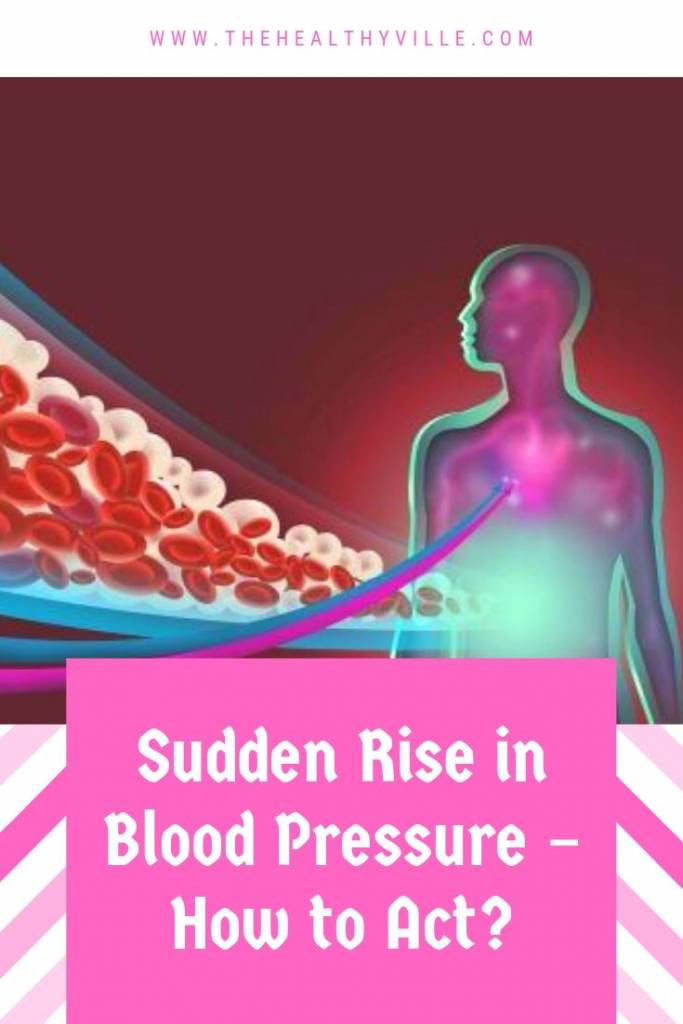Sudden rise in blood pressure can be a danger to the health of the affected person. Therefore, it is important to know how to recognize the symptoms and, thus, act accordingly.
Blood pressure is the measure of the force exerted on the walls of the arteries by the blood as it flows from one organ to another. The recommended blood pressure level for a healthy adult is 120/80 mmHg. However, it may be the case that this level decreases or increases, leading to a drop or rise in blood pressure, due to different factors.
These changes in blood pressure are the result of life habits such as diet, stress and other changes in the body. High or low blood pressure compared to the recommended level is not healthy and poses a danger to the health of the affected person.
A person with high blood pressure, also known as hypertension, can show levels of 140/90 mmHg. Although a point blood pressure rise does not mean suffering from a disease, when it remains in time in a sustained manner, it can pose a health risk.
When the surge comes suddenly, it can be a sign that something in the body is not working as it should. Moreover, it can lead to various accidents at the vascular level or even death.
Causes of the sudden rise in blood pressure
Due to the dangers of a sudden rise in blood pressure, it is important to know the causes and symptoms of it. There are different factors that can cause a rise in blood pressure, among which are:
Pain: severe pain produced as a result of an injury can also cause a rise in blood pressure.
Anxiety: anxiety is one of the most common causes. This is because with stress, certain hormones are released, such as cortisol, which causes the blood vessels to constrict and increases the heart rate.
Salt rich diet: due to excessive salt intake, the body mechanism in charge of blood pressure levels loses efficacy. This causes the blood pressure levels to go off.
Obesity: with obesity, the lipid tissue clogs the blood vessels, so the blood that reaches the heart is insufficient. Consequently, the heart must increase the heart rate and the strength with which it pumps blood, thus increasing the blood pressure.
Pregnancy: It is not uncommon during pregnancy to experience a sudden rise in blood pressure. This situation must be controlled to avoid complications such as preeclampsia, a condition due to fluid retention.
Symptoms
To be able to act quickly in cases of punctual blood pressure rise, it is necessary to recognize the symptoms of it:
- Dizziness
- Sickness.
- Vomiting.
- Shortness of breath.
- Nasal bleeding.
- Blurry vision.
- Excessive sweating.
- Excessive sleepiness.
- Ringing in the ears.
- Difficulty breathing.
- Difficult to focus.
- Increase of cardiac frequency.
What to do in the face of a rise in blood pressure?
It is important to relax.
Faced with a sudden and sudden rise in blood pressure, it is vitally important to lower it quickly. To avoid any complication that puts the life of the person in danger, do the following steps:
- Measure the blood pressure to know the levels of the blood pressure of the person. Especially, if they are hypertensive.
- Place the person in a comfortable position.
- If you are in a cold place, you should shelter the person and if possible, move them to a warm place. This is because low temperatures raise blood pressure.
- If on the other hand it is very hot, you should try to shelter the person in a cool place.
- Try to reduce stress, make the person relax. This way, their blood pressure levels return to normal.
- If after these steps the blood pressure has not decreased, see a doctor immediately. In addition, apart from specific measures against this type of situation, it will be necessary to initiate a treatment to avoid episodes that repeat themselves.
Healthy life habits to regulate blood pressure
It is important to learn how to better manage stress and, as far as possible, avoid it. The exercises of mindfulness and meditation are some of the best measures to learn to calm the mind in different situations and, in general, decrease the levels of emotional tension.
Obviously, it will be necessary to make certain changes in the diet. In this sense, reduce the consumption of foods rich in salt, and avoid the intake of frozen and processed. It is also convenient to stop salting the excess foods and, instead, learn to substitute salt for herbs or other spices.
Changes in eating habits will be decisive, but they should always be inscribed within a healthy lifestyle, so that some measures support others and, together, can provide well-being to the person. Keep in mind that no measure is capable of supposing a “cure” by itself.
Don’t forget to SHARE how to act in case of a sudden rise in blood pressure with your friends and family on your social networks!

